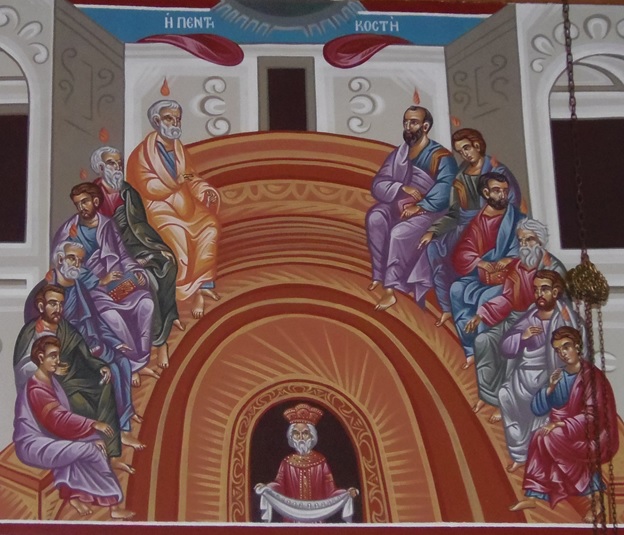The Fear of Pentecost
4 June 2023‘…each one heard their own language being spoken’ (Acts 2, 6). As a result of this event, some 3,000 people believed and were baptized.
The grace of the Holy Spirit made the word of God comprehensible and accessible to the souls of the believers and bore immediate, abundant fruit. Today we celebrate Pentecost, we sing beautiful hymns, full of meaning at the Kneeling Service at Vespers, we preach wonderful sermons about the Holy Spirit, but we also fear the Holy Spirit.

Yes, that’s right. We fear him. Because the Holy Spirit has the potential to transform a religious body into the living Church of Jesus Christ. I wonder at those people who insist that the faithful shouldn’t understand what’s said in Church. Those who oppose the rendition of the texts into the contemporary language of each people. Don’t they realize that this fear of theirs represents an anti-Pentecostal attitude?
Do they perhaps fear that the faithful might realize that they’re all equal members of the body of Christ in the Church and that understanding is not limited to a select few… clergy, theologians and linguists?
All of us, the faithful, should and must have access to what’s happening. How? By doing what God’s done throughout the history of our race: Scripture teaches and the Church acts rightly within its tradition… even though we’re now anti-theological, non-Scriptural and anti-traditionalist.
Are we afraid that the faithful might understand and start asking questions which we who are ‘of the Church’ might then have to answer? It would be a terrible thing for us to have to start reading in order to be prepared to respond to anyone who wanted to learn about the faith.
Are we perhaps afraid that, if the faithful understand, we’ll be rebuked for having departed from the authentic teaching of the Gospel and the proper tradition of the Church? What if they compare it to the situation today, where we say one thing and do another?
Perhaps we fear that that the faithful might wish to participate actively in the life and worship of the Church. Instead of there being a few leading players in the life of the Church who always want to steal the show.
It’s not language which is the issue here. It’s our fear at Pentecost. We fear the vigor of the Spirit of God and the living God, Jesus Christ, whom he presents to us. We fear a Church which isn’t a museum but actually exists and is to be found in the present, at the forefront of life and the world; which is trying to live and to witness to its truth and hope; which takes us out of our comfort zone. We reject the living Church in which the Spirit of God dwells and we want the Church of formalities, traditions and religious transactions.
Let’s choose. It’s time: where the breath of the Spirit blows or the deafening silence and stillness of the dead…
Regarding language, in Bulgaria, at least in the Metropolis of Nevrokop, a rather neat solution has been found. The Epistle, Gospel and sermon are always in the modern language, for obvious reasons. Other than that, some parts of the rest of the service may be in Modern Bulgarian, others in Church Slavonic, depending, it seems, on how the priest feels at any given moment. So the faithful will hear a litany, an exclamation or a blessing, for example, in Modern Bulgarian at one point in the service and the next in Church Slavonic. Or, if there are two or more celebrants, one may use Modern Bulgarian, another Church Slavonic. In this way, the old language continues to be used, but, because of the ‘translation’, is readily understood by those who attend church regularly.






